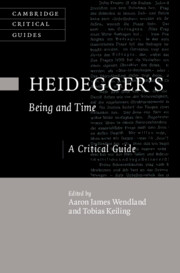Book contents
- Heidegger’s Being and Time
- Cambridge Critical Guides
- Heidegger’s Being and Time
- Copyright page
- Contents
- Contributors
- Acknowledgements
- Abbreviations
- Introduction: The Circle of Understanding
- Chapter 1 Being and Time as a Whole: From Pragmatism, to Existentialism, to a Philosophy of Being, via the Good
- Chapter 2 The Trouble with the Ontological Difference
- Chapter 3 Heidegger’s Evenhanded Approach to Realism and Idealism
- Chapter 4 Discourse as Communicative Expression
- Chapter 5 On Curiosity as Epistemic Vice
- Chapter 6 Rethinking Being and Time as a Resource for Feminist Philosophy
- Chapter 7 Authenticity, Truth, and Cultural Transformation
- Chapter 8 What Does Authenticity Do in Being and Time?
- Chapter 9 Why Ask Why? Retrieving Reason in Being and Time
- Chapter 10 Time’s Origin
- Chapter 11 The Possibility of Death
- Chapter 12 Heidegger on the Failure of Being and Time
- Bibliography
- Index
- CAMBRIDGE CRITICAL GUIDES
Chapter 8 - What Does Authenticity Do in Being and Time?
Published online by Cambridge University Press: 28 June 2025
- Heidegger’s Being and Time
- Cambridge Critical Guides
- Heidegger’s Being and Time
- Copyright page
- Contents
- Contributors
- Acknowledgements
- Abbreviations
- Introduction: The Circle of Understanding
- Chapter 1 Being and Time as a Whole: From Pragmatism, to Existentialism, to a Philosophy of Being, via the Good
- Chapter 2 The Trouble with the Ontological Difference
- Chapter 3 Heidegger’s Evenhanded Approach to Realism and Idealism
- Chapter 4 Discourse as Communicative Expression
- Chapter 5 On Curiosity as Epistemic Vice
- Chapter 6 Rethinking Being and Time as a Resource for Feminist Philosophy
- Chapter 7 Authenticity, Truth, and Cultural Transformation
- Chapter 8 What Does Authenticity Do in Being and Time?
- Chapter 9 Why Ask Why? Retrieving Reason in Being and Time
- Chapter 10 Time’s Origin
- Chapter 11 The Possibility of Death
- Chapter 12 Heidegger on the Failure of Being and Time
- Bibliography
- Index
- CAMBRIDGE CRITICAL GUIDES
Summary
Authenticity plays key methodological and normative roles for early Heidegger: as he puts it, to ‘work out the question of Being adequately … we must make an entity – the inquirer – transparent in his own Being’. But the precise nature of those roles, and how Heidegger differs from other thinkers of authenticity, is much less clear. This chapter considers three possible interpretations of authenticity found in the contemporary literature. On a transcendental reading, authenticity is what allows us to first recognize reasons as such and act in light of norms at all. On a unity reading, authenticity unifies Dasein’s commitments, and thereby grants a special narrative or judgmental coherence to my life. Finally, on the structural reading, ultimately defended here, authenticity is an inchoate awareness of the structural features of normative space and of Dasein’s own way of being. It is only this interpretation, it is argued, that can make sense of Heidegger’s text and the centrality of authenticity within his early work.
Information
- Type
- Chapter
- Information
- Heidegger's Being and TimeA Critical Guide, pp. 158 - 176Publisher: Cambridge University PressPrint publication year: 2025
